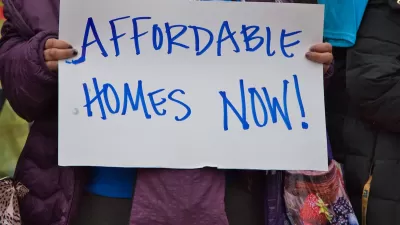James Howard Kunstler has been saying for some time now that when our "ponzi scheme" economy finally crumbles around us, people are going to be very angry, and looking for someone to blame.
James Howard Kunstler has been saying for some time now that
when our "ponzi scheme" economy finally crumbles around us, people are
going to be very angry, and looking for someone to blame.
words have been haunting me in recent weeks as we watch the avalanche
of bankruptcies, foreclosures,
layoffs and scandal roaring through the economy, and struggle to
comprehend the scale of the federal bailout money being feverishly
poured onto the flames. There is a sickening sense that what is
happening is beyond anyone's understanding or control. That people have
a lot to be angry about is beyond question.
However, this understandable anger is being directed by some right-wing political partisans at the most unlikely of
targets: community organizers, the Community Reinvestment Act (CRA),
and most of all, the Association of Community Organizations for Reform Now, or ACORN -- the latter of which, in addition to voter registration drives, has been a major force for community revitalization efforts and housing projects, notably in post-Katrina New Orleans.
And the McCain campaign has been actively encouraging this displaced blame. Worse, this effort to discredit community activism and revitalization is meshed with extreme anti-Obama rhetoric, with the result that a palpable mob-mentality is brewing at McCain-Palin rallies. Some observers are warning the McCain campaign that if the Senator
doesn't tone down his rhetoric and that of his running mate Gov. Sarah
Palin, there could easily be violence. In an op-ed for the Baltimore Sun, Frank Schaeffer accuses Senator McCain of
"...deliberately
feeding the most unhinged elements of our society the red meat of hate,
and therefore of potentially instigating violence. Your rallies are
beginning to look, sound, feel and smell like lynch mobs...John McCain
and Sarah Palin, you are playing with fire, and you know
it. You are unleashing the monster of American hatred and prejudice, to
the peril of all of us. You are doing this in wartime. You are doing
this as our economy collapses. You are doing this in a country with a
history of assassinations."
While all Americans should be
alarmed about what this sort of discourse is doing to the health of
their democracy, readers of this site should be specifically concerned
about how this ire is being turned against planning projects with which
many of us are professionally involved -- that is to say, housing and
revitalization projects in low-income communities.
Despite being quickly and widely debunked in the media (and on Interchange),
the counternarrative that the CRA and ACORN are to blame for the
economonic meltdown for "forcing" banks to give mortgages to
lower-income households to has taken hold on the right. More
seriously, ACORN's voter registration drives have been subject to
relentless criticism from the McCain campaign, highlighting alleged
voter registration irregularities. But defenders of ACORN have been swift to point out not
just the impossibility of fraudulent registration forms resulting in
actual phony votes, but that the real reason for the GOP's attacks on
ACORN is that it has managed to register 1.3 million poor people,
almost all of whom are likely to vote Democrat.
While to his credit, McCain has toned down his negative ads, the
toxicity of the backlash he has unleashed against community-based activism will surely
tarnish the remainder of the campaign, and could easily resonate
beyond; and the impacts this backlash could have on planning for low-income
communities could be serious and long-lasting. Planners working for or
alongside ACORN on housing and community revitalization projects may
well find themselves and their colleagues subject to abuse or harrassment. At the very least, they may have to defend their work publicly and in the media
in an effort to set the record straight and undo some of this damage. However, should the anti-ACORN agenda
carry into a McCain administration, bids to cease federal funding for ACORN will likely bear fruit, putting housing and social justice projects in the 110 cities in which ACORN is active in jeopardy.
Regardless
of the outcome of this election, housing for the poor has become a
controversial project about which powerful political and economic
forces have been violently unleashed. It is incumbent on planners to do
what we can to restore reasonableness to this debate, and to ensure
that the needs of lower-income communities are not cast aside in the
fallout from the economic meltdown -- and more ominously, in the search
for someone on which it can be blamed.

Alabama: Trump Terminates Settlements for Black Communities Harmed By Raw Sewage
Trump deemed the landmark civil rights agreement “illegal DEI and environmental justice policy.”

Planetizen Federal Action Tracker
A weekly monitor of how Trump’s orders and actions are impacting planners and planning in America.

The 120 Year Old Tiny Home Villages That Sheltered San Francisco’s Earthquake Refugees
More than a century ago, San Francisco mobilized to house thousands of residents displaced by the 1906 earthquake. Could their strategy offer a model for the present?

In Both Crashes and Crime, Public Transportation is Far Safer than Driving
Contrary to popular assumptions, public transportation has far lower crash and crime rates than automobile travel. For safer communities, improve and encourage transit travel.

Report: Zoning Reforms Should Complement Nashville’s Ambitious Transit Plan
Without reform, restrictive zoning codes will limit the impact of the city’s planned transit expansion and could exclude some of the residents who depend on transit the most.

Judge Orders Release of Frozen IRA, IIJA Funding
The decision is a victory for environmental groups who charged that freezing funds for critical infrastructure and disaster response programs caused “real and irreparable harm” to communities.
Urban Design for Planners 1: Software Tools
This six-course series explores essential urban design concepts using open source software and equips planners with the tools they need to participate fully in the urban design process.
Planning for Universal Design
Learn the tools for implementing Universal Design in planning regulations.
Clanton & Associates, Inc.
Jessamine County Fiscal Court
Institute for Housing and Urban Development Studies (IHS)
City of Grandview
Harvard GSD Executive Education
Toledo-Lucas County Plan Commissions
Salt Lake City
NYU Wagner Graduate School of Public Service






























